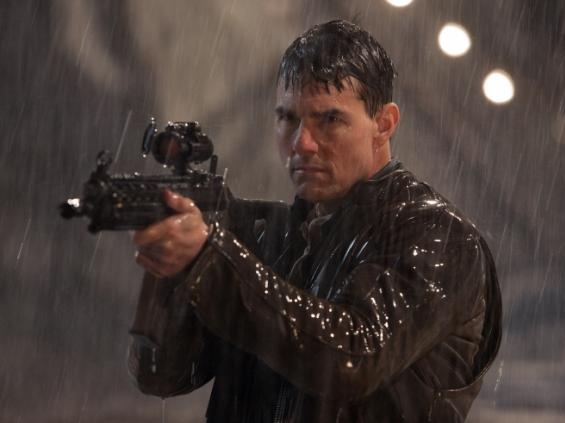Jack Reacher, the star of Lee Child’s generally excellent series of myster/thriller novels, is six-foot-five, 250 lbs, a hulking bruiser of a man. Tom Cruise, who plays Reacher in the appropriately titled “Jack Reacher,” an adaptation of Child’s novel “One Shot,” is famously five-foot-seven, somewhat less than 200 lbs.
When casting was announced, many fans of the novels balked at Cruise’s lack of physical resemblance to the print version, though the complaints often neglected to address a more important issue: will Child’s style be translated well to screen?
If “Jack Reacher” is any indication, then the answer is “not really.”
It’s unfortunate that this great intellectual property has been turned into a film that’s half boilerplate procedural mystery, half advertisement for the awesomeness of its star.
Reacher, a former military policeman, is a wanderer. After a lifetime spent overseas with Uncle Sam, he has returned stateside to tour the country, getting involved in adventures along the way. A top notch investigator, he heads to Pittsburgh after an old foe is arrested for gunning down five people in a mass shooting.
The suspect has a history of violence, but Reacher quickly figures out that the man’s innocent and teams up with a defense attorney (Rosamund Pike) to find the real culprit.
Written and directed by Christopher McQuarrie, whose last film as director was 2000’s great crime film “The Way of the Gun,” this film is really Cruise’s show, clearly intended to establish a new franchise (with nearly 20 books already written, there’s a lot of material). What Cruise lacks in size, he makes up for with his laser-focus persona, sporting an intensity that makes him convincing as a physical force to be reckoned with. Appropriately menacing when uttering hard-boiled dialogue and hyper-competent atsleuthing, he’s pragmatic, sharp, and unafraid of bringing violence to the enemy.
But even as Cruise manages to play someone suitably deadly, he also proves unable to contain his enthusiasm for this kind of role. Whereas the novel’s Reacher comes across as a reluctant hero, a man with a semi-righteous moral code he will relentlessly enforce, the on-screen version seems to be enjoying himself too much. Cruise’s energy, even in quieter scenes, makes him seem eager for confrontation, eventually making Child’s introspective, pragmatic investigator into a traditional action hero.
Literary Reacher is like the anti-action hero action hero, and Cruise’s performance, while maintaining some edge, is more about his own movie star image than that of the character. This is something we’ve seen before, and thus the chance to imprint Child’s uniquely cool character the consciousness of unfamiliar audiences is largely squandered.
While Cruise proves an asset and a drawback, there are two effective supporting performances that outpace the mundane nature of their roles. One is by legendary auteur Werner Herzog, playing a villainous overlord with at least one scene whose implied brutality made this reviewer wince. Another is the great Robert Duvall as a former Marine and shooting range owner who offers Reacher some key assistance. Neither has much time on screen, but both manage to prove memorable.
The cast also includes Richard Jenkins as the District Attorney (and father of the defense lawyer), David Oyelowo as a homicide detective, and Jai Courtney as an assassin on a crash course with Reacher.
Running long at 130 minutes, the film often drags as it explores the shooting mystery, coming off much like your standard police plot on TV with better acting and production values. When it does shift gears to violence, it becomes exciting and tense, no surprise seeing as McQuarrie’s action scenes in “Gun” were some of the best put to film.
The highlight here is a lengthy, suspenseful car chase that sees Reacher tracking bad guys even as a fleet of cop cars pursue him, a scene with a humorously clever resolution. Moments such as these highlight the series’ potential, even as the final scene clumsily positions him as a chivalrous beacon of goodness, which strips the character of the slight darkness that makes him interesting.
Here’s hoping that should there be another onscreen Reacher adventure we’llget less superhero, more anti-hero.

COMMENTS
Please let us know if you're having issues with commenting.